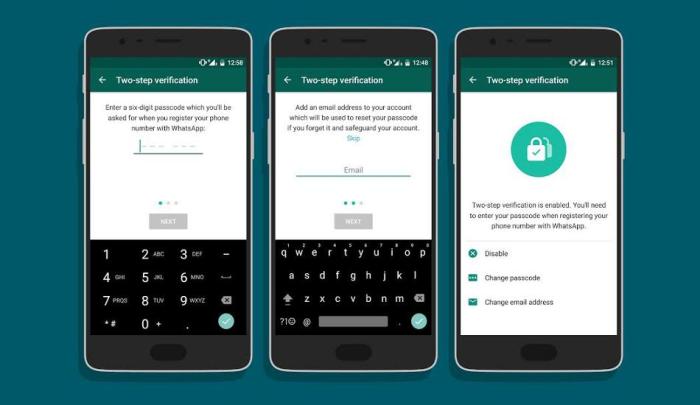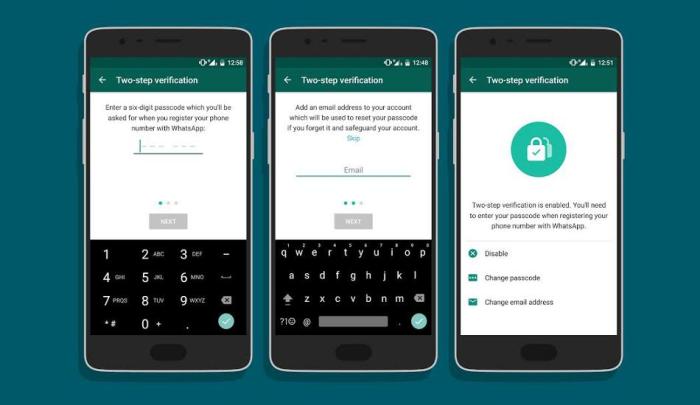In the realm of secure communication, WhatsApp Security Best Practices Guide stands tall as a beacon of knowledge, illuminating the path to safeguarding your conversations and personal data. This guide delves into the intricacies of WhatsApp’s security features, empowering you to navigate the digital landscape with confidence and ease.
Within these pages, you’ll discover the secrets of WhatsApp’s end-to-end encryption, unravel the mysteries of privacy settings, and learn how to craft impenetrable passwords. We’ll explore the potential pitfalls of third-party apps and guide you towards secure integrations. Cybersecurity awareness takes center stage, equipping you to recognize and combat phishing attacks, while technical recommendations provide a roadmap to bolster your WhatsApp defenses.
Encryption and Privacy
WhatsApp employs end-to-end encryption, ensuring that messages, calls, and media shared between users remain private and secure. This encryption ensures that no third party, including WhatsApp, can access or intercept the content of your communications.Privacy settings play a crucial role in maintaining the confidentiality of your information.
By adjusting these settings, you can control who can see your profile picture, status, and last seen status. Additionally, you can choose to share your location with specific contacts or disable this feature entirely.
Enhancing Privacy on WhatsApp
*
-*Use two-step verification
This adds an extra layer of security by requiring you to enter a code sent to your phone number when logging in to your account from a new device.
-
- -*Disable read receipts
This prevents others from knowing when you have read their messages, giving you more control over your privacy.
- -*Disable read receipts
-*Review your privacy settings regularly
Ensure that your settings align with your privacy preferences and make adjustments as needed.
-*Be mindful of what you share
Avoid sharing sensitive information or personal details with unknown or untrusted contacts.
-*Use disappearing messages
This feature allows you to set a timer for messages to disappear after a certain amount of time, providing an additional layer of privacy for sensitive conversations.
Authentication and Account Security

WhatsApp takes account security seriously, offering robust authentication mechanisms to safeguard user data. Understanding these measures is crucial for protecting your account from unauthorized access.
Two-Step Verification
WhatsApp’s two-step verification process adds an extra layer of security by requiring a six-digit code when registering your account on a new device. This code is sent via SMS or a third-party authentication app, ensuring that only you can access your account, even if your password is compromised.
Biometrics
WhatsApp supports biometric authentication methods such as fingerprint and face recognition. These methods provide a convenient and secure way to unlock the app, preventing unauthorized access by others.
Strong Password Creation
Creating a strong password is essential for account security. Follow these best practices:
- Use a combination of uppercase and lowercase letters, numbers, and symbols.
- Avoid using personal information or common words.
- Make your password at least 12 characters long.
- Do not reuse passwords across multiple accounts.
Content Management
WhatsApp is a popular messaging app that allows users to share text, photos, videos, and documents. However, it’s important to be aware of the risks of sharing sensitive information via WhatsApp, as it may not be as secure as other messaging apps.
Here are some guidelines for managing and sharing media files securely on WhatsApp:
Media File Management
- Avoid sharing sensitive information, such as financial data, personal identification numbers (PINs), or passwords, via WhatsApp.
- Be cautious about sharing photos or videos that could be used to identify you or your location.
- If you need to share sensitive information, consider using a more secure messaging app, such as Signal or Telegram.
Data Backups, WhatsApp Security Best Practices Guide
It’s important to back up your WhatsApp data regularly, in case your phone is lost or stolen. You can do this by going to Settings > Chats > Chat Backup and selecting a backup frequency.
Backing up your data will ensure that you don’t lose any important messages or media files if something happens to your phone.
Third-Party Apps and Integrations: WhatsApp Security Best Practices Guide

Third-party apps can enhance WhatsApp’s functionality, but they may also introduce security risks. To ensure your privacy and security, it’s crucial to carefully consider the potential risks and take appropriate precautions.
Evaluating and Selecting Secure Third-Party Apps
-
- Check App Permissions:Review the permissions requested by the app to determine if they align with its intended functionality. Avoid granting unnecessary permissions.
- Read User Reviews:Check user reviews to gain insights into the app’s reliability, privacy practices, and overall user experience.
- Verify App Authenticity:Ensure the app is from a reputable developer and has been downloaded from an official app store.
li> Research App Privacy Policy:Read the app’s privacy policy to understand how your data will be collected, used, and shared.
Cybersecurity Awareness and Education
WhatsApp is a widely used messaging app that can be a target for malicious actors. It is important to be aware of the common cybersecurity threats related to WhatsApp and take steps to protect your account.
Phishing Attacks
Phishing attacks are a common threat on WhatsApp. These attacks involve sending fraudulent messages that appear to come from WhatsApp or other trusted sources. The messages may contain links to malicious websites or request personal information, such as your password or credit card number.It
is important to be able to recognize and avoid phishing attacks. Here are some tips:
- Never click on links in messages from unknown senders.
- Be wary of messages that request personal information.
- Check the sender’s email address or phone number to make sure it is legitimate.
Reporting Suspicious Activity
If you receive a suspicious message on WhatsApp, it is important to report it to WhatsApp. You can do this by forwarding the message to WhatsApp’s support team at [email protected]Reporting suspicious activity helps WhatsApp to identify and take action against malicious actors.
Technical Recommendations
Implementing technical safeguards is crucial for enhancing WhatsApp security. These measures include utilizing a VPN, deploying antivirus software, and configuring secure device settings.
Using a VPN with WhatsApp
A virtual private network (VPN) encrypts your internet traffic, making it more challenging for eavesdroppers to intercept your WhatsApp messages and data. When using WhatsApp with a VPN, your IP address is masked, providing an additional layer of privacy and security.
Antivirus Software for WhatsApp Data Protection
Antivirus software can detect and remove malware that may target WhatsApp and compromise your data. Regularly updating your antivirus software ensures it can identify and neutralize the latest threats.
Secure Device Settings for WhatsApp
- Enable two-factor authentication:This adds an extra layer of security by requiring you to enter a code sent to your phone number when logging into WhatsApp on a new device.
- Use a strong password or passcode:Create a complex password or passcode for your device to prevent unauthorized access.
- Disable auto-download for media:This prevents WhatsApp from automatically downloading media files, reducing the risk of malware or malicious content being downloaded to your device.
- Limit app permissions:Only grant WhatsApp the permissions it needs to function properly, such as access to your contacts and camera.
Additional Resources

To further enhance your understanding and implementation of WhatsApp security best practices, refer to the following resources:
WhatsApp Security Center
- Access WhatsApp’s dedicated security center for comprehensive information on privacy, encryption, and account security.
- Stay updated on the latest security updates, advisories, and best practices.
Privacy Policy
- Review WhatsApp’s privacy policy to understand how your data is collected, used, and shared.
- Ensure alignment with your organization’s privacy regulations and compliance requirements.
Support Forums
- Engage with the WhatsApp community in official support forums.
- Ask questions, share experiences, and seek assistance from WhatsApp experts and fellow users.
Reputable Cybersecurity Websites
- Refer to reputable cybersecurity websites such as SANS Institute, Information Security Forum (ISF), and National Institute of Standards and Technology (NIST) for in-depth knowledge on cybersecurity best practices.
- Stay informed about emerging threats, vulnerabilities, and mitigation strategies.
Case Studies and Examples
- Explore case studies and examples of successful WhatsApp security implementations in various industries.
- Learn from real-world scenarios and best practices to enhance your own security measures.
Conclusion
As you embark on this security journey, remember that knowledge is power. By embracing the best practices Artikeld in this guide, you’ll transform WhatsApp into an impregnable fortress, safeguarding your privacy and ensuring the integrity of your communications. Stay vigilant, stay informed, and let WhatsApp Security Best Practices Guide be your trusted companion in the ever-evolving digital world.
Commonly Asked Questions
Can I use WhatsApp securely without a strong password?
No, a strong password is essential for protecting your WhatsApp account from unauthorized access. Consider using a combination of upper and lowercase letters, numbers, and symbols for maximum security.
What should I do if I receive a suspicious message on WhatsApp?
Report the message to WhatsApp immediately and do not click on any links or open any attachments. Suspicious messages can be a sign of phishing or malware attacks.
Is it safe to share sensitive information on WhatsApp?
While WhatsApp offers end-to-end encryption, it’s important to exercise caution when sharing sensitive information. Consider using alternative secure messaging apps or other methods of communication for highly confidential data.

